Shopping cart
Recent Posts
Subscribe
Sign up to get update news about us. Don't be hasitate your email is safe.

The Social Security Commission was established in 1995, following the promulgation of the Social Security Act, Act No. 34 of 1994.
The Commission, already at the dawn of this brand new year, 2021, remains committed to an old time goal of expanding the welfare of our members and beneficiaries through con- tinuous improvement of people and culture, stakeholder engagement, operational excel- lence and governance, control and customer service.
The Social Security Commission currently, just to provide a brief background, adminis- ters three funds: the Maternity Leave, Sick and Death Benefit Fund (MSD), the Employees’ Compensation fund (ECF), and the Develop- ment Fund (DF)
Two additional funds, namely the National Pension Fund and the National Medical Benefit Fund, as provided under the Social Security Act, are not yet operational.
Therefore, at present, the SSC’s offerings concentrate on social insurance (rather than social protections in the full sense of the term) as each fund is contributory.
We, at the Commission, remain cognizant of the fact that should the National Pension fund becomes operationalised, it would, as a social protection tool it is, ensure income security for people of advanced age. It would help participants to maintain a decent standard of living and help lift them and their dependants out of poverty. This is a noble vision that remains close to our hearts.
Furthermore, the establishment of such a pension fund on a nationwide basis would have a positive impact on social-insurance coverage, lifetime financial security, income redistribution, saving and investments, and financial-sector development.
It is against this background that since 2016 our team within the Commission has been excited about making sure the fund is up and running to fulfil the Social Security Commission‘s mandate.
Generally, the establishment of a social protection and insurance framework is a
aborious and broadly consultative process with key stakeholders. This require adequate research to develop evidence-based models that best address the statutory and fiduciary objectives of these institutions. Given the relatively complicated design and financing options associated with a National Pension Fund it was imperative for the SSC to afford sufficient time to the technical concept development and the consequent evolving policy framework. As a result, various technical consulting teams were appointed during the different stages of the project to facilitate this process. This had to be counter- balanced with the equally competing interests of the existing occupational pension funds and insurance industry in Namibia.
Despite the overall success of the project in terms of delivery milestones, SSC encountered a few challenges along the way, but nevertheless the policy framework was completed and finally submitted with the Ministry of labour, Industrial Relation and Employment Creation. The Ministry however had desired some modifications on the draft policy framework, particularly on the proposed design thereof.
During a 2016 consultative meeting that had brought together experts from the Ministry of labour itself, Namibia Financial Institutions Supervisory Authority (NAMFISA), the SSC Board and management, and consultants from the International Labour Organisation (ILO) ensued to review certain aspects of the NPF policy, governance and the design framework.
Briefly, this is where we are, and in fact had it not been for matters that still need to be worked out amongst all stakeholders, the National Pension Fund would have long been launched and implemented by last year 2020 already.
As regard to the National Medical Benefit Fund, over the past five years, extensive research has been conducted, in fact continues to be conducted, to provide advice and guidance on universal-health coverage by a multi-disciplinary and multi-sectoral committee, the Universal Health Coverage Advisory Committee of Namibia (UHCAN).
UHCAN is an advisory committee comprised of stakeholders from the Social Security Commission, the Ministries of Finance, Labour and Health, as well as stakeholders from medical schemes, unions, employers’ federations, provider associations, academic institutions and donors.
The Ministry of Health continues to investigate the implications of establishing a universal healthcare. On the other hand, the Commission needs to determine which role the National Medical Benefit Fund could assume and still avoid a duplication in the provision of healthcare benefits.
These institutions will continue to cooperate with each other closely to determine the best manner in which decent medical treatment and benefits can be provided for all Namibians.
Issued by Communications & Marketing Department, SSC
Comments are closed